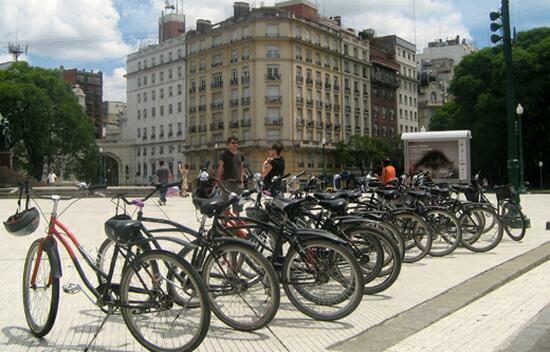In the 2000s economists coined a term for a new economic
trend: Globalization. The world was
getting smaller and closer. Economists
link emerging globalization back to the early 1970s with the “open skies”
policy of airline travel. It was then
possible to be anywhere in the world in a single day’s travel. This also meant goods could also be shipped
anywhere in the world in a single day or definitely by the next morning. Globalization
continued into the 1990s with the first published and live websites. By 1995 nearly every organization had some
form of a website. Websites made it
possible to interact with the world in seconds, without leaving home or the
office. The speed and power of the web
permeated other businesses and layers of society--everything needed to be
quicker. The world can be delivered
right to your home or office with immediate effect.
Except in Argentina.
It is summer in the Southern Hemisphere and that means the
weather for biking is near perfect. What
it also means is that biking enthusiasts and bike buyers are pouring into the local
bike shops looking for new equipment and new bikes. Only once inside however, they aren’t seeing much of
anything.
Bicycle manufacturing has, like many other industries,
freely accepted globalization and has thrived with the practice of bringing the
best the world has to offer together. For
any given bike, components come from Europe, Asia, the US and together a new
machine is born. Argentina would rather have
every part come from Argentina.
This past February Argentina enacted a new law that
restricts the importing of over 600 goods.
The idea was to guard domestic companies from unwanted competition. The country has had some success but for the
most part this protectionist economic policy has hamstrung quite a few
industries, the local bicycle shop being one. As a result fewer bikes are being sold in the
country. Building a bike is truly a global
initiative and with restrictions on foreign-made parts it is very difficult to
get a complete bicycle in Argentina. One
shop owner noted that for most of his stock something is missing: pedals from
Asia, wheels from Europe, saddles from Italy, and so on. The owner claims his business will be down
15% this year that ends today.
Inflation has hit the bicycle industry very hard because of
the new laws. Take for example a $150
bike. In Argentina it will sell for
$700. People are riding their old
bikes, it looks like the 1970s with all of the retro cruisers rolling through
the country (see photo).
Buenos Aires, like other global metropolitan cities, wants
people riding bikes. People on bikes
mean less smog, gridlocked traffic, parking problems and more. This new policy comes at a bad
time as the city of Buenos Aires enacted a “Better on a Bike” program that took
ridership from 30,000 bikers up to 150,000 dedicated riders in just three
years. In 2013 Buenos Aires plans to
build 30 miles of bike lanes. The city
has already opened 50 miles since 2009.
What is most interesting is that foreign parts only make up
11% of bikes sold in Argentina but as one shop owner noted, people want a bike
that is 100% finished and he sums up, “without those parts the bike is useless."
Visit our website at www.stickybottleteam.net. Have a Happy New Year!


No comments:
Post a Comment